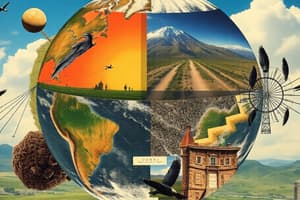Podcast
Questions and Answers
What is the composition of the present atmosphere primarily made up of?
What is the composition of the present atmosphere primarily made up of?
- 50% Nitrogen, 35% Oxygen, 15% Argon
- 70% Argon, 20% Nitrogen, 10% Oxygen
- 80% Oxygen, 15% Nitrogen, 5% Argon
- 78% Nitrogen, 21% Oxygen, 0.9% Argon (correct)
What is a key feature of the biogeochemical cycle?
What is a key feature of the biogeochemical cycle?
- It is a continuous cycle with no endpoints
- It only involves the hydrosphere
- It contains only living components
- It facilitates the movement of chemicals between nonliving and living systems (correct)
Which system includes all living forms on Earth?
Which system includes all living forms on Earth?
- Atmosphere
- Lithosphere
- Biosphere (correct)
- Hydrosphere
What aspect of oxygen is fundamental to living organisms?
What aspect of oxygen is fundamental to living organisms?
Which statement accurately describes the flow of matter and energy in Earth's subsystems?
Which statement accurately describes the flow of matter and energy in Earth's subsystems?
In what way does smoke affect animals and humans according to the information provided?
In what way does smoke affect animals and humans according to the information provided?
Which component of the Earth’s subsystem does not include rocks?
Which component of the Earth’s subsystem does not include rocks?
What is contained primarily in the salty oceans of Earth?
What is contained primarily in the salty oceans of Earth?
What characterizes an isolated system?
What characterizes an isolated system?
Which statement is true about a closed system?
Which statement is true about a closed system?
Why is Earth considered a closed system?
Why is Earth considered a closed system?
Which of the following are the four great reservoirs of Earth's system?
Which of the following are the four great reservoirs of Earth's system?
What implication does having a fixed amount of matter in a closed system have?
What implication does having a fixed amount of matter in a closed system have?
What happens if changes are made in one part of a closed system?
What happens if changes are made in one part of a closed system?
What type of system allows exchanges of both energy and matter?
What type of system allows exchanges of both energy and matter?
Energy enters Earth's system primarily in what form?
Energy enters Earth's system primarily in what form?
Flashcards are hidden until you start studying
Study Notes
What is a System?
- A system consists of parts that work together.
- Systems involve collections of interacting objects.
Types of Systems
- Isolated System: No exchange of matter or energy with surroundings.
- Closed System: Allows energy exchange but not matter exchange with surroundings.
- Open System: Permits exchange of both energy and matter across its boundary.
Earth's System
- Earth behaves as a closed system, largely confining matter within its boundaries.
- Four major reservoirs interact constantly: atmosphere, hydrosphere, biosphere, and geosphere.
Energy Flow
- Solar radiation provides abundant energy to Earth.
- Energy leaves the system as longer-wavelength infrared radiation.
- Matter remains largely confined within the Earth system.
Implications of a Closed System
- The fixed amount of matter means the planet's mineral resources are finite and irreplaceable.
- Changes in one part of a closed system impact other parts, promoting interconnections.
Atmosphere
- Thin gaseous layer enveloping Earth's lithosphere.
- Current composition: 78% nitrogen, 21% oxygen, 0.9% argon, plus trace gases.
Geosphere
- Comprises rocks of the crust and mantle, outer liquid core, and solid inner core.
Hydrosphere
- Contains water covering much of Earth, with 97% found in oceans.
Biosphere
- Encompasses all life forms across geosphere, hydrosphere, and atmosphere.
Flow of Matter and Energy
- Biogeochemical Cycle: Describes the movement of chemicals through the biosphere, from nonliving reservoirs into food chains, and back.
Important Cycles
- Nitrogen Cycle: Integral for ecosystems, illustrating the transformation and flow of nitrogen.
- Oxygen Cycle: Essential for life; derived from biological processes and serves foundational roles in vital molecules.
Interconnectedness of Earth's Subsystems
- Smoke in the atmosphere can affect air quality and the respiratory health of organisms.
- Decreased vegetation can lead to increased soil erosion due to loss of root structures maintaining soil stability.
Studying That Suits You
Use AI to generate personalized quizzes and flashcards to suit your learning preferences.




